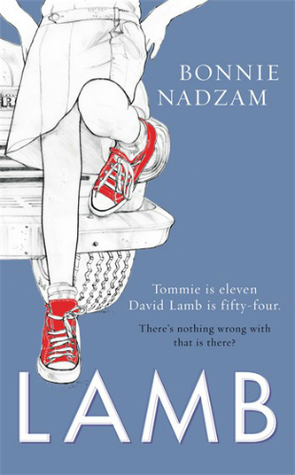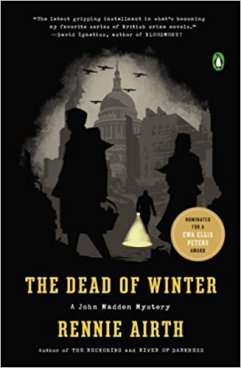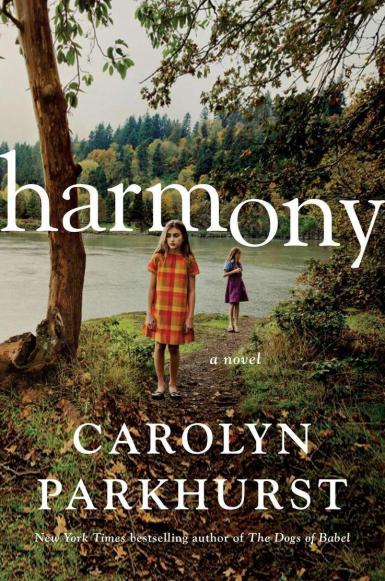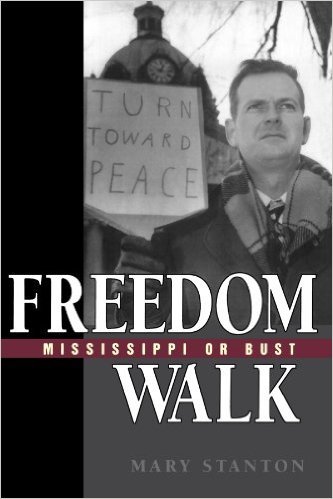
Rating: B-/ I really don’t know what to say about this book. It was an extremely odd novel, and I haven’t quite sorted my feelings about it out yet. I enjoy stories with taboo subject matter, but what I don’t enjoy is having a narrative suddenly just kind of end in an anti-climax. Lamb is a book where I kept expecting something big to happen, but the conclusion left me puzzled and disappointed. I often found the writing style confusing, but I did think the author did a good job developing her main characters. This book is going to be hard for some people to read because the main character, David Lamb, is basically a pedophile.
The story revolves around Lamb taking an lonely eleven-year-old girl named Tommie to his cabin out west for a ‘vacation.’ Of course, one man’s vacation is another man’s kidnapping, and Tommie’s mom and her mom’s boyfriend have no idea where she is. David’s interest in the girl is clearly inappropriate, and also complex. He deludes himself in to thinking he is doing what is best for her and that he has her best interests at heart. Tommie is bullied at school by her so-called ‘friends’ and is neglected at home, and she obviously has ambiguous feelings about her abducter. What follows is essentially a two-person drama, with occasional visits from minor characters.
Bonnie Nadzam incorporates a unusual writing style and I sometimes was not sure which of the characters was talking and what was going on. The relationship in this book is hard to define because there’s very little clear-cut child molestation happening. David kisses the girl on the mouth and shares her sleeping bag, which is obviously very creepy and skeevy, but he never has sex with her and lust doesn’t seem to be his primary motivation. The relationship between the two of them is disturbing but also weirdly compelling; David Lamb is established early on as a very manipulative person, and you can see how he manipulates the girl throughout the entire story in sometimes subtle ways.
However, I was startled by how suddenly this book ended and I would have liked the conclusion to have a major turning point for the characters. Instead it ended with a fizzle and left me going “That’s it?” I won’t tell you how it ended in case you decide to read this book yourself. Lamb is a very character driven book, so it’s a good thing I enjoy character-driven stories a lot. I found some of the dialogue unbelievable; I felt that in her attempt to be different, Bonnie Nadzam sometimes forgot how real people talk.
I wish there had been more plot in this book; the plot development seems to be pretty much zero. Basically David Lamb takes this girl, drives her out west, acts like he’s in love with her even though he’s in his fifties and she’s eleven. That’s it. And just when you think something big is going to happen, the book just ends. The reason I’m giving this book more than a C was I thought the writing was good and that Nadzam had a good feel for who her characters were. I liked the way she developed them and even though their relationship was obviously inappropriate on so many levels, I thought she did a good job portraying it in a way that was sometimes creepily ambiguous.
There’s a lot of description of the Western landscape in this book, detailed tangents about the sky and grass and leaves, and I found myself phasing out during these moments. Lamb is a psychologically interesting novel, and the main appeal seems to be in observing the characters and speculating on why they act the way they do. The further you get into the book, the more pathetically sad David Lamb becomes, and obviously you fear for Tommie, although she doesn’t consider herself a victim and is more worried about her parents busting her for leaving town with an older man than Lamb’s advances.
The Stockholm Syndrome is strong here, and we watch as Lamb mentally deteriorates and Tommie nurtures his wounded ego and provides him with much-needed validation. I think the way the two characters interacted was very well-done, but I also found the narrative frustrating. People who like books that are heavy on character development and subtext but low on plot will probably like this, and I’m intrigued to hear that this novel was adapted into an independent film. I guess I’ll say that I liked this book, but didn’t love it. I think there was a lot of confusion in this novel that could have been cleared up if Nadzam had written it in a more straightforward way. The woman can write, but her attempts to be clever rob the book of some of it’s intimacy.
Advertisements Share this:




